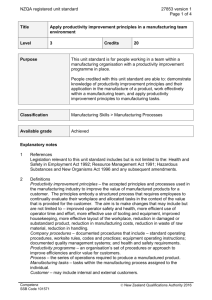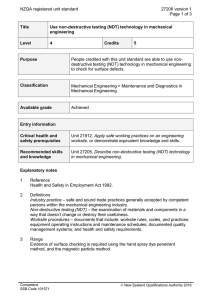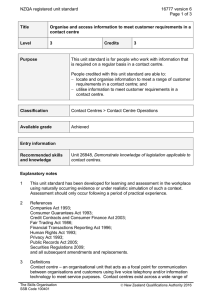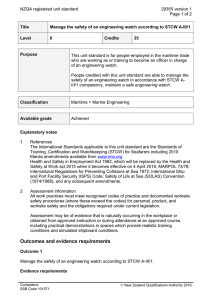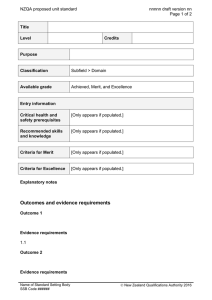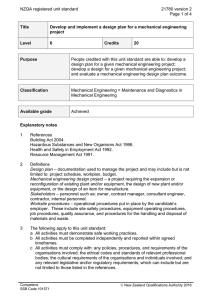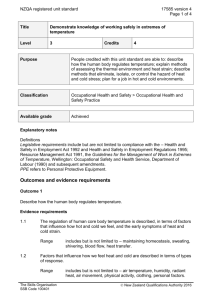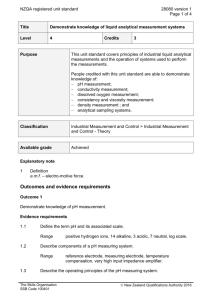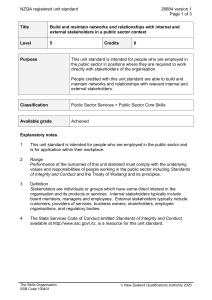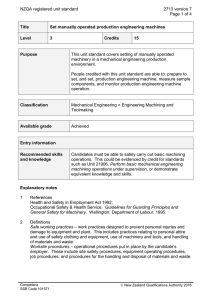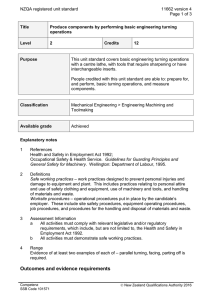11400 Manage testing and measuring procedures within
advertisement
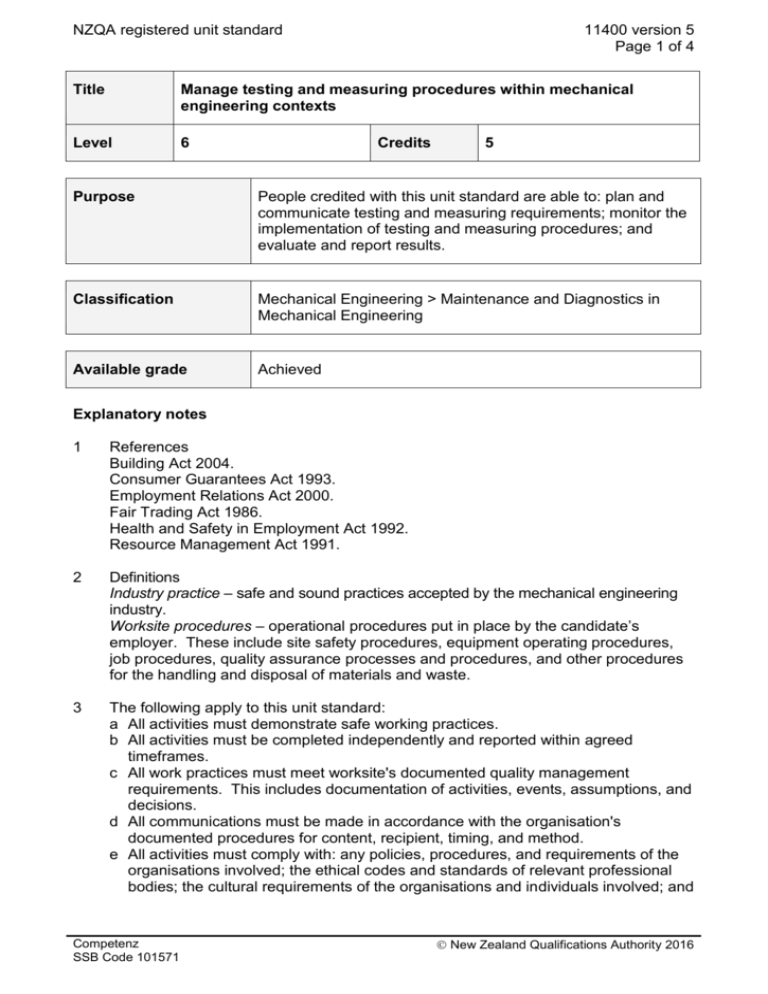
NZQA registered unit standard 11400 version 5 Page 1 of 4 Title Manage testing and measuring procedures within mechanical engineering contexts Level 6 Credits 5 Purpose People credited with this unit standard are able to: plan and communicate testing and measuring requirements; monitor the implementation of testing and measuring procedures; and evaluate and report results. Classification Mechanical Engineering > Maintenance and Diagnostics in Mechanical Engineering Available grade Achieved Explanatory notes 1 References Building Act 2004. Consumer Guarantees Act 1993. Employment Relations Act 2000. Fair Trading Act 1986. Health and Safety in Employment Act 1992. Resource Management Act 1991. 2 Definitions Industry practice – safe and sound practices accepted by the mechanical engineering industry. Worksite procedures – operational procedures put in place by the candidate’s employer. These include site safety procedures, equipment operating procedures, job procedures, quality assurance processes and procedures, and other procedures for the handling and disposal of materials and waste. 3 The following apply to this unit standard: a All activities must demonstrate safe working practices. b All activities must be completed independently and reported within agreed timeframes. c All work practices must meet worksite's documented quality management requirements. This includes documentation of activities, events, assumptions, and decisions. d All communications must be made in accordance with the organisation's documented procedures for content, recipient, timing, and method. e All activities must comply with: any policies, procedures, and requirements of the organisations involved; the ethical codes and standards of relevant professional bodies; the cultural requirements of the organisations and individuals involved; and Competenz SSB Code 101571 New Zealand Qualifications Authority 2016 NZQA registered unit standard 11400 version 5 Page 2 of 4 any relevant legislative and/or regulatory requirements, which can include but are not limited to those listed in the references. 4 Range Evidence of the following is required: testing and measuring – one-off, ongoing; single tests and measurements and combinations of tests and measurements; tests and measurements include but are not limited to – fluid flow, pressure, temperature, vibration, humidity, angular and linear velocities, thermal contraction and expansion, stresses and strains, electrical supply, and physical measurements. Outcomes and evidence requirements Outcome 1 Plan and communicate testing and measuring requirements. Evidence requirements 1.1 Plan identifies the aims of testing and measuring activities in accordance with the organisation's requirements. 1.2 Design and selection of testing and measuring methodologies meets the organisation's aims and industry practice. Range selection – national, industry, organisation standards. 1.3 Testing and measuring plan facilitates the achievement of the aims, and identifies sequence of activities, equipment and materials to be used, and staffing requirements. 1.4 Plan is documented and communicated in accordance with the organisation's requirements and worksite procedures. Outcome 2 Monitor the implementation of testing and measuring procedures. Evidence requirements 2.1 Monitoring of testing and measuring activities establishes the degree of conformance with plans and expectations. Range 2.2 coordination, sequence, calibration, accuracy, timeliness, safety, validity, recording. Corrective actions taken contribute to the realignment of activities with the aims. Outcome 3 Evaluate and report results. Competenz SSB Code 101571 New Zealand Qualifications Authority 2016 NZQA registered unit standard 11400 version 5 Page 3 of 4 Evidence requirements 3.1 Evaluation of results establishes their validity in terms of the aims. 3.2 Conclusions drawn are congruent with the results. 3.3 Results are reported within agreed timeframes in accordance with the plan and worksite procedures. Range format, content, distribution. Planned review date 31 December 2016 Status information and last date for assessment for superseded versions Process Version Date Last Date for Assessment Registration 1 24 February 1998 31 December 2011 Revision 2 18 September 2001 31 December 2011 Rollover and Revision 3 25 July 2006 31 December 2011 Rollover 4 20 June 2008 31 December 2014 Review 5 17 November 2011 N/A Consent and Moderation Requirements (CMR) reference 0013 This CMR can be accessed at http://www.nzqa.govt.nz/framework/search/index.do. Please note Providers must be granted consent to assess against standards (accredited) by NZQA, before they can report credits from assessment against unit standards or deliver courses of study leading to that assessment. Industry Training Organisations must be granted consent to assess against standards by NZQA before they can register credits from assessment against unit standards. Providers and Industry Training Organisations, which have been granted consent and which are assessing against unit standards must engage with the moderation system that applies to those standards. Requirements for consent to assess and an outline of the moderation system that applies to this standard are outlined in the Consent and Moderation Requirements (CMR). The CMR also includes useful information about special requirements for organisations wishing to develop education and training programmes, such as minimum qualifications for tutors and assessors, and special resource requirements. Competenz SSB Code 101571 New Zealand Qualifications Authority 2016 NZQA registered unit standard 11400 version 5 Page 4 of 4 Comments on this unit standard Please contact Competenz on qualifications@competenz.org.nz if you wish to suggest changes to the content of this unit standard. Competenz SSB Code 101571 New Zealand Qualifications Authority 2016
